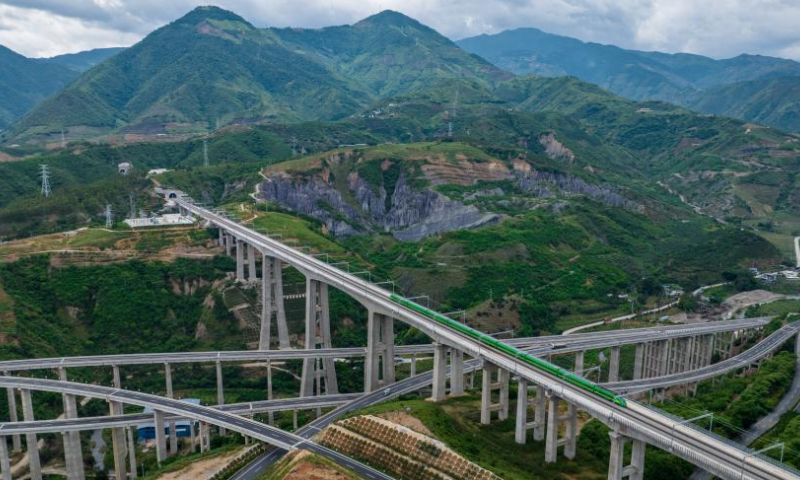
Aerial photo shows a Fuxing bullet train running through Nanxihe grand bridge on the China-Laos Railway in Southwest China's Yunnan Province, on June 2, 2022. Photo: Xinhua
The China-proposed Belt and Road Initiative (BRI) is a mega project that helps developing countries and has opened up a new path of development for all countries, foreign observers said at the Belt and Road Studies Network Plenary Meeting in Beijing. They spoke highly of the achievements of the BRI and conducted in-depth discussions on its development over the past decade.
This year marks the 10th anniversary of the BRI. Taking this opportunity, the Belt and Road Studies Network Plenary Meeting was held in Beijing on October 17. Nearly 300 dignitaries, officials and experts attended the meeting.
In an interview with the Global Times, former Japanese Prime Minister Yukio Hatoyama said the BRI is "a wonderful idea," noting that it has witnessed "great development" over the last decade. "Some Western countries are talking about the debt trap and other problems, but I know that is not the case and many developing countries applaud the benefits brought by the BRI, which can also make a great contribution to world peace," Hatoyama said.
Former prime minister of the Czech Republic Jiri Paroubek echoed Hatoyama's views, noting that the BRI project is improving international relations and benefiting developing countries, as it is instrumental in enhancing their infrastructure quality, including the construction of new highways, roads, railways, and ports, ultimately raising living standards.
"The BRI is the main economic project at this moment in the world. But it is a pity that the Western countries lack a similar initiative to aid developing nations," Paroubek told the Global Times.
During the meeting, Chinese and foreign experts and delegates from multiple fields actively exchanged views and experiences on how to effectively address global challenges. They also expressed their willingness to continue to strengthen communication, deepen mutual trust, and jointly push forward the BRI cooperation.
The world has entered a period of turbulence, but there are also new opportunities. Cooperation or confrontation has once again become the question of the times. For this, Hatoyama proposed a question: What is the ideal form of international relations in the midst of the chaos of today's world? He emphasized that what is most needed now is a relationship in which countries respect their own dignity while respecting the dignity of others. In that spirit, it is important to build an international community in which countries with different values can understand, respect and cooperate with each other.
"Today, however, there is a movement, especially in the West, to foment a clash of values that exacerbates geopolitical conflicts, and that gives me a strong sense of crisis. That is why I believe that the participation of delegations from so many countries in this meeting is very significant. It gives hope for the future," said the former Japanese prime minister.
Former Polish deputy prime minister Grzegorz W. Kolodko highlighted that there is a solution to the problems, but "we are not on the right track to solve them and that is not because of China."
History and reality have proven that only win-win cooperation can lead to long-term development. Over the past decade, the BRI has become more than just an economic path; it has opened up a new path of development for all countries. China's confidence in continuing to promote the high-quality development of the BRI is also because of extensive support from the participating countries.

